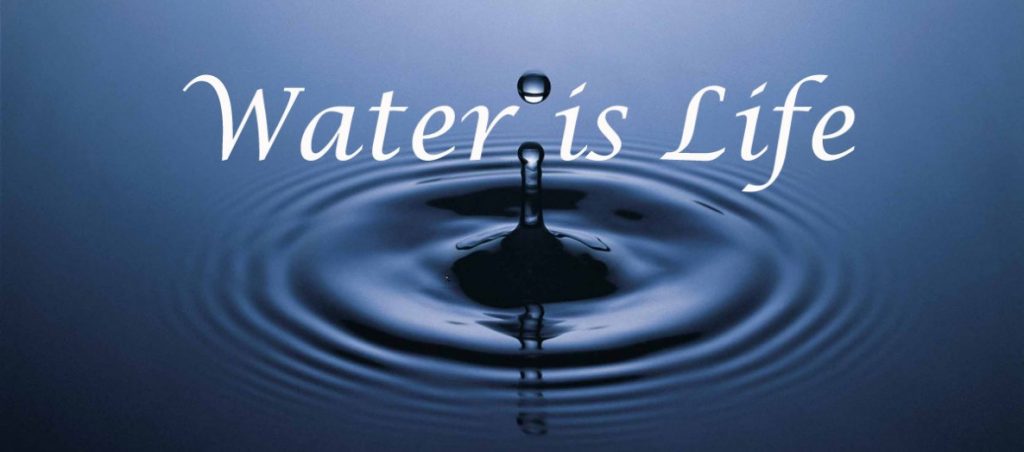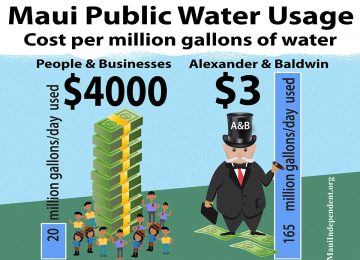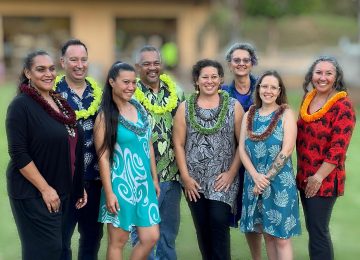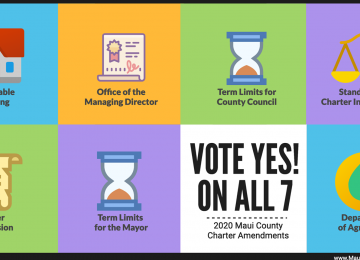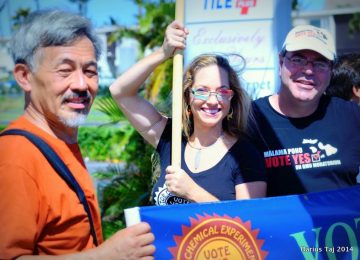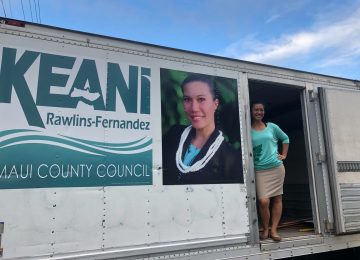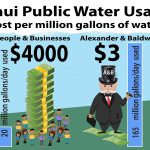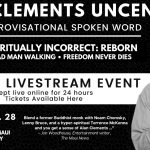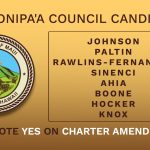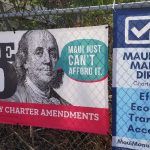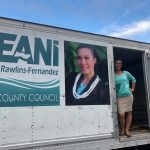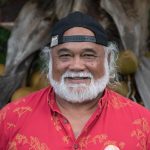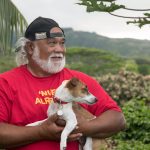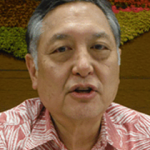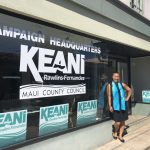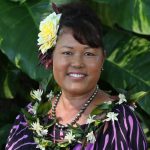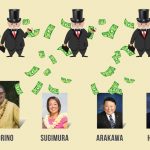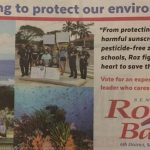On February 22 and 23, 2017, Maui citizens will have a chance to speak out against a 30-year extension of a rigged plantation-era water system that for more than a century has diverted the majority of all the water from vibrant streams on the island to benefit the Alexander & Baldwin Corporation for less than 1% of its market value.
Kaniela Ing, an outspoken 28-year old Representative of Maui in the Hawaii State Legislature, urges residents who are concerned with the island’s ecological and agricultural future to show up at one of the water system hearings and “bring your emotions and stories to overcome the political skill,” power, and government-corrupting influence of A&B.
The hearing will provide an opportunity for members of the public and community leaders to express alternatives to corporate agribusiness and mono crops for Maui’s public water. Ing believes that Maui’s “agricultural future must be centered around leasing small plots to small, innovative farmers and allowing shared equipment though co-owned ag parks. Let’s democratize the plantation. We have an opportunity to set an example of self-sustainability for the world.”
Public comment concerning what many in Maui view as A&B’s massive water theft will be heard on Wednesday, February 22 from 5 to 7 p.m. (in the Maui Electric Company Meeting Room in Kahului) and Thursday, February 23 from 5 to 7 p.m. in the Hai’ku Park and Community Center.
The public will be commenting on this environmental impact statement preparation notice (”EISPN”) that will be reviewed by the state Department of Land and Natural Resources in a few months. The EISPN was commissioned by A&B as it attempts to secure a 30-year extension for about 120 million gallons of water per day for the East Maui EMI Aqueduct System. Incredibly, as Maui’s Sierra Club has reported, without an extension of this huge water giveaway, “documents submitted by A&B indicate there are 132 million gallons per day available from their existing private sources.”
A number of grassroots critics of the current system will speak out at the hearings about the fact that the EISPN was supposed to present alternatives to the current system—but instead avoids doing so. The alternative that A&B is probably most concerned with the public demanding is the one that would place the rights of the ecology and people of Maui to their own PUBLIC water resource over the rights of Alexander & Baldwin, Hawaii’s largest real estate company (with a market capitalization of more than $2 billion) to profit.
This is the same battle being fought by the Standing Rock Lakota people over the Dakota Access Pipeline: the right of Native People to protect their water from pollution, to share in the water, and to determine sustainable agriculture and protect our shared ecology. Against the power of some of the world’s largest companies and their campaign donation-corrupted enablers in government.
Lucienne de Naie, one of Maui’s leading public resource advocates, says that the EIS draft under review is inadequate because it fails to quantify the amount of water used, it fails to propose alternatives to the plantation era water giveaway system and because it starts with the false premise that a system which has starved farmers or water for generations and cut off native fish has had zero environmental impact on the island’s ecology
“In general,” de Naie observes, “it appears that the EIS is attempting to a ignore the fact that the East Maui leases awarded by BLNR have NEVER undergone environmental review and therefore, any impacts of the huge amounts of water taken, have never been discussed or evaluated. By not quantifying the amount of water extracted from the watershed (which is the entire base flow of many streams during dry conditions), A&B can avoid any discussion of impacts to actual public trust resources, traditional cultural practices, native stream life, and local communities.
“In essence,” de Naie explains, “under the status quo lease system, the life-giving waters of our stream ecosystems are redefined as an ‘agricultural operations commodity” and our natural stream systems are redefined as a private “plantation plumbing system” adapted to deliver irrigation water to central Maui.”
For the corporate welfare price of just $160,000 per year, the EMI System had supplied an average of 165 million gallons of water per day to 33,000 acres of A&B owned sugar plantation land in Central Maui for decades. Now that the cane-burning, air-fouling, polluting sugar plantations have closed due to unprofitability, the water they use could instead restore stream flow, fish populations upstream, and diversified agriculture. Maui currently imports more than 90% of its food, while Hawaiian farmers of environmentally restorative organic, or indigenous food like taro, are starved of water.
The aqueduct system and corporate water giveaway are rooted in century-old plantation-era water “contracts” imposed upon Hawaii by five immensely powerful American families (including Alexander and Baldwin), who funded a deadly militia to take power from the Native Hawaiian dynasty during the notorious “Bayonet Constitution” of 1887.
“To understand this or any other natural resource issue in Hawaii you need to understand history,” Ing observed in this powerful speech about A&B”S water usage to the state legislature last year. “Centuries ago my ancestors understood that naturally flowing water wasn’t something you can simply own. You can borrow it from the Aina to use as you need for your families’ subsistence as a steward of a balanced ecosystem. That principle was not just for some… even the chiefs or kings could not own the streams, rather they exercised control as trustees of a public resource. That changed in the plantation era when a small group of wealthy business owners diverted water without consent from kalo farmers across the state. It decimated Hawaiian families it desecrated sacred waterfalls and it terminated many Hawaiian farms all for the sole benefit of just five missionary families. That spurred lawsuits that persisted well, until today.”
“I come from seven generations of Hawaii Family,” Ing continued. “I worked in the pineapple fields as a teen to help my widowed mom pay the bills. So I understand the struggle of plantation workers. I would not be here today if not for Maui’s plantation history But more than ever before Maui is at a crucial crossroads and the people we serve have privileged us with the tremendous power to make decisions like these that will shape the next seven generations to come.”
“I believe that we are ready for self-determination. I believe that we have the capacity, the education, and the foresight to take our futures and our local economy into our own hands, and the citizens right here in Hawaii, without relying on mainland owned corporations. May the end of the plantation era signal the end of the plantation mentality.”
Maui supports a robust, tourist-driven economy of about $5 billion a year. The Alexander & Baldwin company has used its century old, gunboat diplomacy granted agricultural water deals to justify the appropriation of more than one half of all water used on the 145,000 person island of Maui for decades, despite the fact that its sugar plantation employed only 1% of the workers in Maui, and was worth less than $25 million annually (less than one-half of 1% of the island’s economy). The year-round growing season, abundant sunshine and ample rains make it ideal for growing high-value crops like coffee, organic vegetables and grass-fed beef. But plantation mono crops, like the sugar plantation that dominated the island for decades, are water hogs and produce nothing that to sustain the local food system. As a result, Maui is dependent upon expensive imports for more than 90% of its food. Meanwhile, indigenous foods and native fish, which sustained Native Hawaiians for centuries before their islands were subjugated by Alexander and Baldwin, along with a few other powerful white families from the United States, can barely be found.
Alika Atay, the Native Hawaiian organic farmer and outspoken water protector whose election to the County Council three months ago startled Maui’s Old guard power establishment, believes that the misappropriation of Maui’s water has led to what he terms “Cultural genocide” for local Hawaiians. As the new chair of Maui’s Water Resources Committee, he will work to transform the situation. “With the end of the last plantation, there is a new opportunity for Native water rights,” he observes.
Looking at Standing Rock, whose flame is being dispersed to ecological struggles by native peoples around the world, Atay, in his barrel-chested voice, proclaims: “Water and earth protectors, Maui needs you.”
Council Member Atay who, like most Maui leaders who have not been influenced by the political largesse of A&B’s river of campaign contributions (the multi-billion dollar corporation is by far the largest political donor and employer of lobbyists in Hawaii) sees no reason that A&B should not pay a market rate for the public resource that is the water flowing through the East Maui ditch system.
Atay points out that some residents and farmers pay $4 for a thousand gallons of water on Maui, and that even at a discounted rate of $1 per thousand gallons, A&B would be paying nearly $50 million per year for its water. This closer to market rate would be about 300 times the $160,000 per year fee that A&B had been paying to supply its sugar plantations.
Of course, A&B could use less water, and leave more of it in the streams, to replenish the fish that Native Hawaiians like Atay ate in their childhood, but rarely, if ever, see in recent years.. They could also allow upcountry homeowners and farmers, some of whom, Atay notes, have been waiting 20 years for a water permit, to tap into into their fair share of the island’s water.
Maui County Council Member Kelly King agrees that evolving from a plantation-era sweetheart deal for endless free water to a market system based on the County’s economic, public and ecological interest is essential if Maui is to thrive.
As an independent new member of the County Council, King is bringing the informed perspective of a successful eco-entrepreneur to Maui’s government. She and her husband Bob founded Pacific Biodiesel, a pioneer in the alternative fuels industry. “My biggest concern with A&B’s “plan,” and I use that term lightly, King observes, is that it ignores the essential question of who is going to do the farming? Not one acre has been leased to a local farm. We need a system that we can trust.”
Shortly before the important hearings, Kaniela Ing said that he will do everything he can to help build an equitable system at the state level, but that it will require citizens standing up and speaking out across the state. “A&B takes half the water on Maui, for what this past decade has been less than 1% of the County’s economic activity,” “ “This corporation exaggerated their value to our society, while in reality, it is slowing growth by gobbling up resources. This is what happens when you allow a single for-profit corporation to monopolize your water source.”
“It’s not that A&B is an evil corporation run by evil people. But it’s an evil system that can only be undone by government. Maui is set to be an example of regenerative and sustainable agriculture,” Ing observes. “But we’re going to need some serious political disruption in order to do that.”


